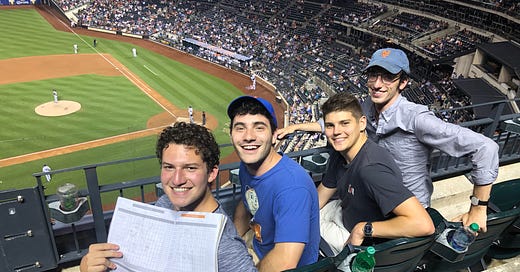Dear readers,
We’re interrupting our election-induced hiatus to bring you some brief thoughts on Oliver Emmett Freiberg, my (Calder’s) friend who passed away suddenly and shockingly two weeks ago.
This feels like a natural place to honor him because he proved every day that caring about sports means more than just rooting for laundry. I met him in the second grade and was lucky enough to know him for 20 years. Thanks so much to everyone for the well wishes.
-Calder
I’ve been thinking for the last couple of weeks about what kind of a person Oliver (or Ollie, Freiberg, Freibs, etc.) was. The adjectives that I’ve heard so often from friends and family — and the ones that have come to my mind as well — speak to his singularity, how he was unique, a true individual, quirky in all the best ways. I’ve also been thinking about the things he loved: Various New York City sports teams, a good meal, a nice pair of loafers.
It's funny in some ways to pair those two things together. His interests were interests shared by many of my friends. I’m thinking in particular of his love of sports. Almost every eulogy at his service mentioned how devoted he was to the teams that he loved — and rightfully so. For many men — myself sometimes included — that sort of care for a team can also serve as a way to connect with each other, to express our emotions to each other without having to do so directly. Saying “I love this team” (or “I hate this team”) becomes a more societally acceptable way of saying “I love you” or “I’m happy you’re here with me.”
This was very obviously not the way things were for Oliver — he never had a hard time expressing his love for others. And I think it speaks to how he could be both a singular person and a deeply relatable one at the same time.

He loved the Jets because his capacity to love was endless. He loved them not because it felt like a socially acceptable thing to do, but because it was another outlet for his care, another way to express his devotion. And going to a sporting event or watching one in a bar or at home with friends let him deepen his friendships with people who might not have been as comfortable expressing that care as he was.
It feels like something that Oliver figured out, or somehow knew innately, or was taught by his wonderful parents and siblings from a young age — everyone loved him because he wasn’t constantly worried about being loved. It’s somehow glib, but it’s also a truth that no one else I know was able to appreciate from such a young age: that if you just be yourself, other people will be drawn to you. It helped, of course, that his natural personality was so silly and fun-loving and kind.
He was also incredibly fast — like literally, physically quick. For years he held the unofficial but coveted title of the quickest kid in our grade. He was a great athlete, and he was competitive, but he let all of this kinetic energy fuel and deepen his relationships rather than cheapen them.
When I’ve explained him in the past two weeks to people who didn’t have the good fortune of knowing him, I’ve tried to keep these two ideas in my head at the same time. He was at once completely easy to talk to and relate to and completely unlike anyone else I ever met.
It’s a combination that, no matter his various neuroses, can only be found in someone whose soul is totally carefree. Since second grade, he provided that model for the rest of us. It’s something that I’ll be thinking about and working towards emulating forever.





how did he die?
I am so sorry.